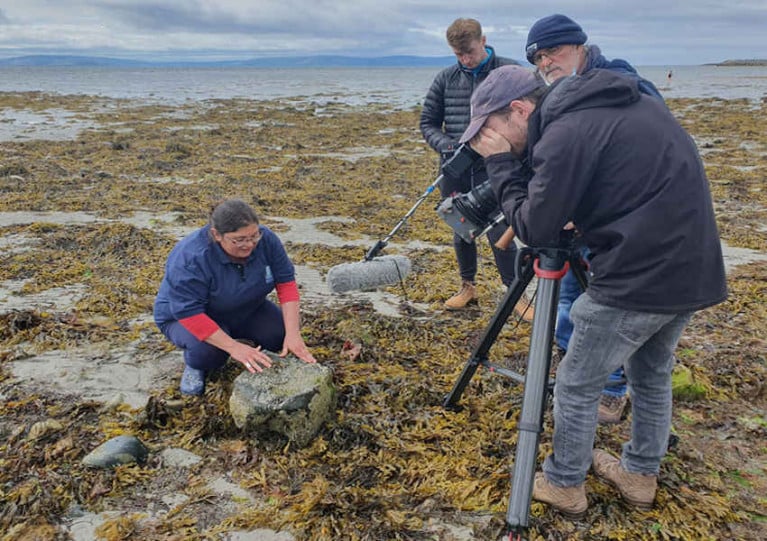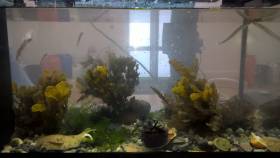Displaying items by tag: Science Week
Waterways Ireland is Ready for Science Week 2022
Waterways Ireland have shared their enthusiasm at once again being a part of Science Week, which runs this year from Sunday 13 to Sunday 20 November.
The Learning Zone website will host ‘Explore Ireland’s Waterways’, an online workshop which takes you on a virtual visit of exploration to your local canal, river or lake.
This workshop is full of fun and interesting activities covering a range of topics ideal for either classroom based or outdoor learning, the cross-border body for Ireland’s inland waterways says.
What is biodiversity? Do you know what the words species, habitat of ecosystem mean? Check out the Waterways Wildlife Fact File to find out more about the diverse variety of wildlife found within our waterways.
Our waterways are a haven of biodiversity. It’s very important that we all respect these environments while we enjoy the benefits they offer. The Waterways Hero!! activity highlights the importance of being a responsible waterway user.
Make you own Waterway Eco-Dial to bring it on a nature walk or watch the Explore Ireland’s Waterways video to identify some of the plants & animals living along your local waterway
You can also make the most of the last of the autumn leaves with the Autumn on the Waterways tree-creation activity.
Explore these and much more in the Waterways Ireland Learning Zone during Science Week 2022 this week.
To celebrate Science Week, the Marine Institute and the Explorers Education Programme are supporting the 2021 Galway Science and Technology Festival, which kicked off on Sunday 7 November and continues to Sunday 21 November.
“We are delighted to engage with parents and children again this year to inspire the next generation to be ocean champions and pursue marine careers,” said the Marine Institute’s Patricia Orme.
The Explorers Education Programme and Galway Atlantaquaria are providing school classes with guided tours of Ireland’s largest native species aquarium.
Primary school children will receive an Explorers resource pack and access the aquarium’s virtual tour. Explorers’ Wild About Wildlife on the Seashore short films will also be showcased for Science Week.
Dive beneath the surface to explore our deep sea in The Wild Atlantic – Sea Science exhibition at Galway City Museum. Free to visitors, the gallery features new exhibitions on climate change, surveys at sea, and life along the seashore.
In the ROV simulator, explore ocean depths like a marine scientist and discover cold-water corals, shipwrecks and a rare shark nursery.
Visitors to the exhibition can pick up a free children's activity book to continue exploring the marine world from home.
Those engaging virtually can learn about our ocean and climate with ‘The Science Guy’ Mark Langtry in the Marine Institute’s Sea Science Series available on the Galway Science & Technology Festival website.
Mark brings the wonders of sea science to the screen with his entertaining, sometimes explosive, and educational sea science shows. The four-part series includes episodes on ocean acidification, creating ocean currents, and experiments on temperature and salinity.
And discover how scientists at the Marine Institute are increasing our understanding of the ocean through their research with the ‘Our People’ video series, which profiles the study and career paths of our people and the work they do at the Marine Institute.
Meanwhile, the Marine Institute is running a competition on the Galway Science & Technology Festival Facebook page. View the short film Ireland's Marine Life and guess the correct number of species featured for the chance to win a LEGO City Ocean Exploration Submarine Set.
In Ireland’s Marine Life, follow Fiadh, a gannet journeying over and underwater and meeting sea creatures along the way — from tiny hermit crabs and jellyfish to dolphins and basking sharks.
Get Wild About Wildlife with the Explorers Education Team for Science Week
The Marine Institute’s Explorers Education Programme is interacting with children around Ireland among events for Science Week, which continues to this weekend.
Exploring the seashore will be the focus of the Explorers team as they share their Wild About Wildlife on the Seashore film and host Q&As with primary school pupils tomorrow, Wednesday 11 November.
Join them as they go on a journey to one of the most extreme places on earth where animals live. Find out about the seashells and their friends, including some of the tiniest periwinkles to top shells with the coolest spirals, feasting on seaweed.
Then head to the lower shore to help the team hunt down the carnivorous dog whelk — the shellfish which loves to make limpets into soup!
See the websites for the Cork Science Festival, Kerry Science Festival, Midlands Science, Galway Science & Technology Festival and the South-East Science Festival for more, and browse the full list of events on the SFI website.
Irish Weather Buoy Network Features On RTE’s ‘Weather Live’ Tonight
#Weather - The work of the Marine Institute's Irish Weather Buoy Network will feature on RTE One's Weather Live this evening (Friday 17 November).
The TV programme has filmed the redeployment of the M5 weather buoy, which broke free during Storm Ophelia. The show will also feature an interview with the Marine Institute's Dr Guy Westbrook.
A weather buoy has been transported to the Botanic Gardens in Dublin, where Weather Live broadcasts live, so those tuning in can see what one looks like.
The Irish Weather Buoy Network delivers data every hour that is then fed into a global information network which includes Met Éireann, the Irish Meterological Service. This data is then used to inform forecasts as well as long-term information gathering.
Located off the South East coast, the M5 weather buoy captured two records during Ophelia: a record individual wave (Hmax) of 17.81m and a record significant wave height (Hs) of 12.97m.
During the storm, the raging seas caused the M5 mooring to break and the buoy needed to be recovered to shore when the seas had calmed.
Due to the relative importance to forecasters of the M5 weather observing location, it was decided to deploy the M4 target system that had been on test in Killybegs at M5.
This buoy was disassembled and transported by road to Cobh dockyard where it was loaded onto the ILV Granuaile and prepared for subsequent deployment.
Marine Institute staff embarked the vessel on 1 November and deployment of the buoy took place the next day in exceptionally calm conditions.
Weather Live is a three-day television event on RTÉ One that focuses on the fascinating world of weather. It’s presented by Kathryn Thomas and features meteorologists including Evelyn Cusack, Gerald Fleming and Gerry Murphy, and coincides with events for Science Week 2017, as previously reported on Afloat.ie.
The third and final broadcast of the series goes out live this evening Friday 17 November at 7pm on RTE One.
Learn More About ’Science Of The Sea’ During Science Week 2017
#MarineScience - Science of the sea will be celebrated by the Marine Institute via a number of events taking place during Science Week from Sunday 12 to Sunday 19 November.
The institute will host an interactive stand at the Mayo Science & Technology Open Day on the GMIT campus in Castlebar on Sunday 19 November. Among the exhibits will be two small aquariums where sea creatures can be observed.
The Galway Science & Technology Festival, which is celebrating 20 years of showcasing Galway as a city of science, technology, engineering, art and maths, takes place later in the month on Sunday 26 November.
The Marine Institute will be showcasing its work at the event in NUI Galway and encouraging everyone to learn more about marine science.
As part of Science Week, RTÉ is airing a three-day live television event all about the weather.
Amongst the topics covered, Weather Live on RTÉ One at 7pm next Wednesday, Thursday and Friday will feature the recent Hurricane Ophelia.
The Marine Institute has been working with the programme makers on this item, as it includes the record wave detected by the M5 weather buoy during the storm nearly a month ago.
Elsewhere, Galway Atlantaquaria is hosting a new exhibit ‘Our Ocean, Our Health – Observe, Enjoy and Explore the Digital Ocean’ that features a live feed from the SmartBay Subsea Observatory in Spiddal, Co Galway.
The ocean observatory is supported by the Marine Institute and gives viewers a unique insight into what is happening in real time beneath the sea.
Science Week 2017 is set to be the biggest yet and is part of Science Foundation Ireland’s work in promoting the potential that science and discovery offer Ireland, today and in tomorrow’s world.
































































